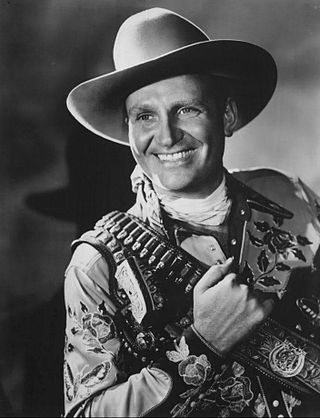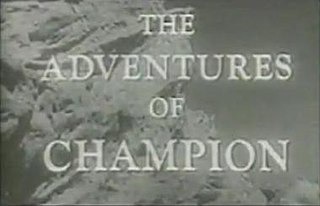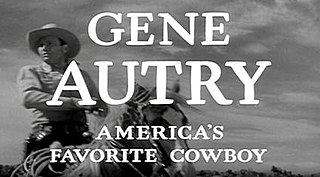Related Research Articles

Melody Ranch is a 1940 Western musical film directed by Joseph Santley and starring Gene Autry, Jimmy Durante, and Ann Miller. Written by Jack Moffitt, F. Hugh Herbert, Bradford Ropes, and Betty Burbridge, the film is about a singing cowboy who returns to his hometown to restore order when his former childhood enemies take over the frontier town. In 2002, the film was added to the National Film Registry by the National Film Preservation Board and selected for preservation as being "culturally, historically, or aesthetically significant."

Orvon Grover "Gene" Autry, nicknamed the Singing Cowboy, was an American actor, musician, singer, composer, rodeo performer, and baseball team owner, who largely gained fame by singing in a crooning style on radio, in films, and on television for more than three decades, beginning in the early 1930s.

Roy Rogers, nicknamed the King of the Cowboys, was an American singer, actor, television host, and rodeo performer.

The Adventures of Champion is an American children's Western television series that aired from September 23, 1955, to March 3, 1956, for 26 episodes on CBS. In the United Kingdom, the series was re-broadcast under the title Champion the Wonder Horse. The series was repeated on and off by the BBC in the UK throughout the 70s, 80s and early 90s, with its final BBC broadcast being the episode "The Stone Heart" on 23 January 1993.

Lester Alvin Burnett, better known as Smiley Burnette, was an American country music performer and a comedic actor in Western films and on radio and TV, playing sidekick to Gene Autry, Roy Rogers, and other B-movie cowboys. He was also a prolific singer-songwriter who is reported to have played proficiently over 100 musical instruments, sometimes more than one simultaneously. His career, beginning in 1934, spanned four decades, including a regular role on CBS-TV's Petticoat Junction in the 1960s.

Maxwell Emmett "Pat" Buttram was an American character actor. Buttram was known for playing the sidekick of Gene Autry and for playing the character of Mr. Haney in the television series Green Acres. He had a distinctive voice that, in his own words, "never quite made it through puberty."

The Phantom Empire is a 1935 American Western serial film directed by Otto Brower and B. Reeves Eason and starring Gene Autry, Frankie Darro, and Betsy King Ross. This 12-chapter Mascot Pictures serial combined the Western, musical and science-fiction genres. The duration of the first episode is 30 minutes, while that of the rest is about 20 minutes. The serial film is about a singing cowboy who stumbles upon an ancient subterranean civilization living beneath his own ranch that becomes corrupted by unscrupulous greedy speculators from the surface. In 1940, a 70-minute feature film edited from the serial was released under the titles Radio Ranch or Men with Steel Faces. This was Gene Autry's first starring role, playing himself as a singing cowboy. It is considered to be the first science-fiction Western.

The Gene Autry Show is an American western/cowboy television series which aired for 91 episodes on CBS from July 23, 1950 until August 7, 1956, originally sponsored by Wrigley's Doublemint chewing gum.
"Back in the Saddle Again" was the signature song of American cowboy entertainer Gene Autry. It was co-written by Autry with Ray Whitley and first released in 1939. The song was associated with Autry throughout his career and was used as the name of Autry's autobiography in 1976. Members of the Western Writers of America chose it as fifth of the Top 100 Western songs of all time.

James Clarence Wakely was an American actor, songwriter, country music vocalist, and one of the last singing cowboys. During the 1930s, 1940s and 1950s, he released records, appeared in several B-Western movies with most of the major studios, appeared on radio and television and even had his own series of comic books. His duet singles with Margaret Whiting from 1949 until 1951, produced a string of top seven hits, including 1949's number one hit on the US country chart and pop music chart, "Slippin' Around". Wakely owned two music publishing companies in later years, and performed at the Grand Ole Opry until shortly before his death.

Elizabeth Burbridge was an American screenwriter and actress, best known for her Western screenplays.

Champion the Wonder Horse was the on-screen companion of singing cowboy Gene Autry in 79 films between 1935 and 1952, and 91 television episodes of The Gene Autry Show between 1950 and 1955. In addition, Champion starred in 26 episodes of his own television series The Adventures of Champion in 1955 and 1956. Throughout these years, Autry used three horses to portray "Champion": the original Champion who appeared in Autry films from 1935 to 1942, Champion Jr. who appeared in Autry films from 1946 to 1950, and Television Champion, who appeared in Autry's films from 1950 to 1953, and in the television series during the 1950s. Several other "Champion" horses were used as stunt doubles and for personal appearances throughout the years.

Melody Trail is a 1935 American Western film directed by Joseph Kane and starring Gene Autry, Ann Rutherford, and Smiley Burnette. Written by Sherman L. Lowe and Betty Burbridge, the film is about a singing cowboy who goes after the men who kidnapped the baby he should have been babysitting. The film features the songs "On the Melody Trail", "A Lone Cowboy on the Lone Prairie", and "Western Lullaby".

Home in Wyomin' is a 1942 American Western film directed by William Morgan and starring Gene Autry, Smiley Burnette, and Fay McKenzie. Based on a story by Stuart Palmer, the film is about a singing cowboy who helps out a former employer in trouble with his failing rodeo while romancing a woman reporter. In Home in Wyomin', Autry sang his hit songs "Be Honest with Me", "Back in the Saddle Again", and "Tweedle O'Twill", as well as Irving Berlin's "Any Bonds Today", becoming the first major star to sing the official song of the U.S. Defense Bond campaign during the war.

Gene Autry's Melody Ranch is a Western variety radio show in the United States. A 15-minute pilot show aired on December 31, 1939. The program ran from January 7, 1940 to August 1, 1943, and from September 23, 1945 to May 16, 1956. The show's entire run was broadcast over the CBS radio network, sponsored by Doublemint gum. The approximately two-year interruption resulted from Autry's enlistment in the United States Army to serve in World War II. Initially titled Doublemint's Melody Ranch, the show's name was changed to Gene Autry's Melody Ranch in early 1941. Episodes were 30 minutes long except for a 15-minute version that ran from September 23, 1945 to June 16, 1946. The theme song was "Back in the Saddle Again".
The Roy Rogers Show was a 30-minute Western radio program in the United States. It began in 1944, ended in 1955, and was carried on more than 500 stations. Because of demands on Rogers' time for personal appearances and making films, the show was one of the first radio series to be transcribed.

Horace Murphy was an American film actor. He appeared in more than 120 films between 1931 and 1953.
Death Valley Days is a radio Western in the United States. It was broadcast on the Blue Network/ABC, CBS, and NBC from September 30, 1930, to September 14, 1951. It "was one of radio's earliest and longest lasting programs." Beginning August 10, 1944, the program was called Death Valley Sheriff, and on June 29, 1945, it became simply The Sheriff.
Hopalong Cassidy is a radio western in the United States, featuring the character Hopalong Cassidy created by writer Clarence E. Mulford. It was syndicated via electrical transcription, beginning in 1948 and continuing into 1950. Its network broadcasts began on Mutual January 1, 1950, and ended on CBS December 27, 1952.

Bobby Benson and the B-Bar-B Riders is an old-time radio juvenile Western adventure program in the United States, one of the first juvenile radio programs. It was broadcast on CBS October 17, 1932 - December 11, 1936, and on Mutual June 21, 1949 - June 17, 1955.
References
- ↑ Rosenkrantz, Linda (September 11, 2005). "Trigger had film hay-day". Union Tribune San Diego. Retrieved May 2, 2014.
- 1 2 3 4 5 French, Jack; Siegel, David S. (2013). Radio Rides the Range: A Reference Guide to Western Drama on the Air, 1929-1967. McFarland. pp. 13–14. ISBN 9780786471461 . Retrieved 28 September 2016.
- ↑ Magers, Boyd. "Adventures of Champion". Western Clippings. Retrieved May 2, 2014.